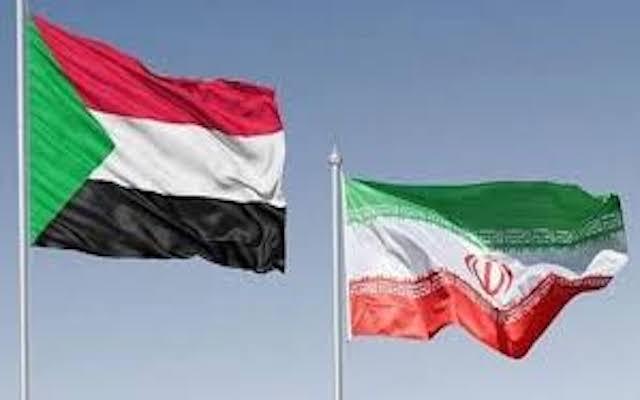In a significant development that underscores the complex geopolitical dynamics in the Red Sea region, Sudan has reportedly declined Iran's proposition to establish a permanent naval base along its Red Sea coastline. According to a report in the Paris based Sudan Tribune, Ahmad Hasan Mohamed, an intelligence adviser to Sudan's military leadership, revealed in an interview that Iran's initiative aimed at constructing a naval outpost was primarily for intelligence gathering purposes, with intentions to closely monitor maritime traffic navigating through the strategic Suez Canal and proximate to Israel.
Iran articulated its intentions under the guise of bolstering Sudan's military capabilities, offering explosive drones to aid in the battle against rebel factions amidst the ongoing civil war, and even proposed deploying a helicopter-carrying warship as part of the deal. Nonetheless, Sudan, wary of jeopardizing its burgeoning relations with both the United States and Israel, opted to reject Iran's overtures. This decision reflects Sudan's cautious approach to international engagements, especially considering the potential implications on its diplomatic relationships. Sudan has been working to establish closer ties to the Jewish State and in an effor to bring them closer to that goal, signed the Abraham Accords Declaration in 2021. Negotiations over a bilateral agreement between Israel and Sudan have remained underway since the signing and in February of 2023, the two nations officially established diplomatic relations.
Iran attempted to convince Sudan to permit the establishment of a naval base on its Red Sea coast, According to a WSJ report
— i24NEWS English (@i24NEWS_EN) March 3, 2024
Naba Mohiedeen bring the details from Port Sudan pic.twitter.com/fpgt63tMYp
The context of the decision to deny Iran's request is notably influenced by the broader ambitions of Iran to expand its influence across one of the world's most vital shipping corridors. Through its support for the Houthi rebels in Yemen, Iran has sought to disrupt maritime traffic, leveraging the conflict to exert pressure on Israel and its allies. This strategy has been marked by the Houthi blockade of maritime routes since November, amid escalating tensions in the Gaza Strip, aimed at compelling Israel to negotiate a ceasefire. The Iran-backed Yemeni militia has not only targeted ships with ties to Israel but has also extended its aggression towards vessels associated with the United States and the United Kingdom, in retaliation for their support of Israel.
Iran unsuccessfully pressed Sudan to let it build a permanent naval base on the country's Red Sea coast, which would have allowed Tehran to monitor maritime traffic to and from the Suez Canal and Israelhttps://t.co/qpuLvdqcxP
— Adam Milstein (@AdamMilstein) March 3, 2024
Sudan's internal strife, characterized by a civil war now entering its tenth month, has rendered the nation a battleground for regional power plays. The military's engagement with the paramilitary Rapid Support Forces (RSF) has drawn in external support, with Iran providing drones to bolster Sudan's military capabilities, a continuation of their longstanding partnership in military technology. This relationship, however, has raised alarms internationally, with Iran's support for proxy groups across the Middle East contributing to regional destabilization concerns. The involvement of the Iranian Revolutionary Guard (IRGC) in various conflicts underscores the apprehensions regarding Iran's growing influence and its implications for regional security dynamics.
3 years ago Sudan joined the Abraham Accords and was removed from the U.S. State Sponsors of Terrorism list. Within 2 years the Biden administration insisted on a process that resulted in a civil war. Now they’re importing Iranian drones. https://t.co/djK9g320gH
— Robert Greenway (@RC_Greenway) March 1, 2024
Sudan's refusal to accommodate Iran's naval base request highlights the strategic significance of its geographical positioning along the Red Sea, attracting attention from various regional actors seeking to assert their influence. The ongoing conflict between the Sudanese army and RSF has further complicated the situation, with allegations of human rights abuses and a worsening humanitarian crisis. Amidst these tensions, the United Arab Emirates (UAE) has been implicated by the Sudanese government for allegedly supplying weapons to the RSF, a claim that UAE officials have denied. Reports also suggest Egyptian support for Sudanese troops, adding layers to the intricate web of regional alliances and rivalries.
Sudan is being ravaged by the vicious ambitions of Iran. Iran is selling to Abdel Fattah al-Burhan, the Chairman of the Transitional Sovereignty Council of Sudan advanced weapons. These weapons including drones are killing the innocent Sudanese population. #Iran is also… pic.twitter.com/xfzI95Vrlt
— TheCapitolInstitute (@CapitolInstitut) March 2, 2024
Sudan's stance on the proposed Iranian naval base, coupled with the involvement of other regional powers, underscores the volatile and complex nature of the situation in Sudan. The country's military cooperation with Iran, albeit limited, has drawn criticism, particularly from the United States, which has been urged to address the UAE's alleged support for the RSF as a precondition for any critique of Sudan's engagements with Iran. This intricate geopolitical scenario highlights the delicate balance Sudan must navigate amidst its internal challenges and the broader regional power dynamics.


